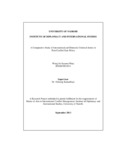| dc.contributor.author | Wang’ele, Inyuma M | |
| dc.date.accessioned | 2013-11-19T06:40:36Z | |
| dc.date.available | 2013-11-19T06:40:36Z | |
| dc.date.issued | 2013-09 | |
| dc.identifier.citation | A Research Project submitted in partial fulfilment for the requirements of Master of Arts in International Conflict Management, Institute of Diplomacy and International Studies, University of Nairobi | en |
| dc.identifier.uri | http://erepository.uonbi.ac.ke:8080/xmlui/handle/123456789/59354 | |
| dc.description.abstract | Any post-conflict criminal justice processes aims at contributing to democracy and
the triumph of the rule of law over the feeling of revenge due to either a prolonged or
intensive conflict. Perceptions by the local population are very crucial in such a process. The
study analyses international and domestic criminal justice process in post-conflict East
Africa, it examines the relationship between community participation in criminal processes
and the effect of its outcome on peace and reconciliation. To achieve this objective, the study
examines various modes of criminal justice processes in post-conflict East Africa. The study
equally examines the factors affecting the success or failure of international and domestic
criminal justice within the region by: (i) examining the outcome of the process, (ii)
examining perceptions by the local population; (iii) Examine the operations of post-conflict
criminal justice institutions in post conflict society. The study is guided by the presumption
that community participation in post-conflict criminal justice enhances societal peace and
reconciliation. The study will be undertaken using both qualitative and quantitative research
methods with the sample population chosen across East Africa. It seeks to test the following
hypotheses; (i) That an increase in community participation in post-conflict criminal justice
processes decreases the level of societal instability in a post-conflict society; (ii) That
decrease in the level of community participation in post-conflict criminal justice processes,
increases chances of societal instability in a post-conflict society; and (iii) That there is no
relationship between community participation in post-conflict criminal justice processes and
the level of societal stability of the post-conflict state. Having laid out and compared various
post-conflict criminal justice mechanisms in terms of their respective origins, objectives, their
operations; and an evaluation of the outcome, the study will examine community reactions to
each criminal justice process with a view of establishing how their participation affects the
process of peace and reconciliation. | en |
| dc.language.iso | en | en |
| dc.publisher | University of Nairobi | en |
| dc.title | A comparative study of international and domestic criminal justice in Post-Conflict East Africa | en |
| dc.type | Thesis | en |
| local.publisher | Institute of Diplomacy and International Studies | en |

